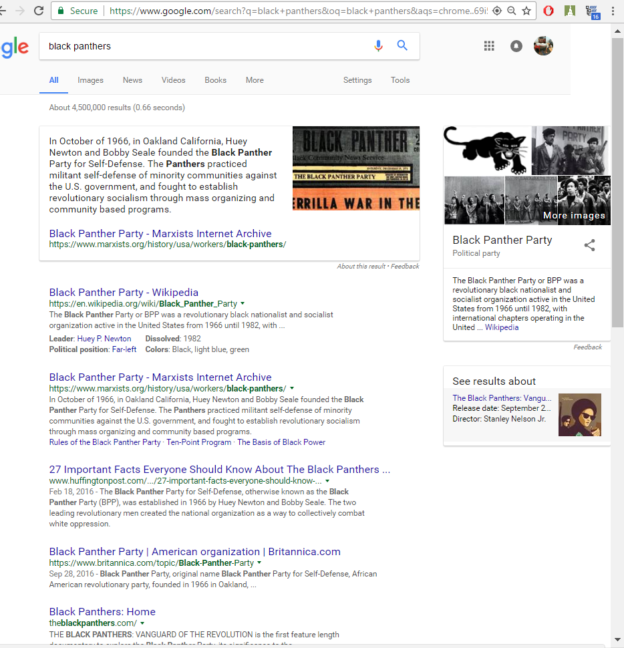The phrase I searched to compare the algorithms between Google and the Dartmouth Library Catalog was “black panthers.” While I was pleasantly surprised that the Google results represented just (albeit, liberal) readings of the party, the library catalog’s results were certainly more in line with a racial revolutionary’s perspective on the party.
At the top of the Google search was an excerpt from the Marxists Internet Archive, not from Wikipedia. That was interesting because Google decided to display an understanding of the racial group from a primarily class-conscious perspective as its banner reading/explanation. Nonetheless, the first five results were relatively diverse and positive. First, the Wikipedia entry described the group as a “revolutionary black nationalist and social organization.” Using largely positive tones about the group, the entry gave the history of the organization and detailed its encounters with government [and police] oppression in the form of COINTELPRO and related federal endeavors. Second, the Marxists Internet Archive used the language of “revolutionary socialism” and “working class emancipation” to describe and frame the history of the party. Third, the Huffington Post, a left-leaning news source, published a post detailing 27 facts that people ought to know about the party. The structure of the article told a story of the party being peaceful until MLK’s assassination. Fourth, the Encyclopedia Britannica described the party in a slightly positive tone, covering controversial issues with slight bias. Fifth, the Black Panthers Website advertises and describes the feature length documentary “The Black Panthers: Vanguard of the Revolution.”
Using the Dartmouth Library Catalog yielded much more radical results. The first entry was the book Black Panther by Ta-Nehisi Coates, someone that strongly identifies with black revolutionary ethics. The second result was a scrapbook project done by Bryan Shih, capturing oral histories and pictures of and by surviving Black Panther members. By sharing their oral histories, this project is definitely conveying a pro-revolution stance on the party. The third result was the documentary outlined in the fifth Google result. A quick scan of the rest of the results revealed a litany of books on the party written from the perspectives of Black revolutionaries.
Overall, it is clear that Google’s algorithms attempted to isolate search results that were more neutral on the party than the College’s library catalog’s algorithms.
